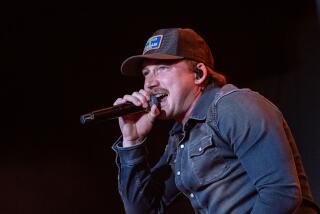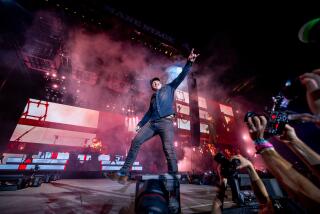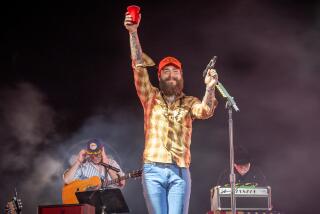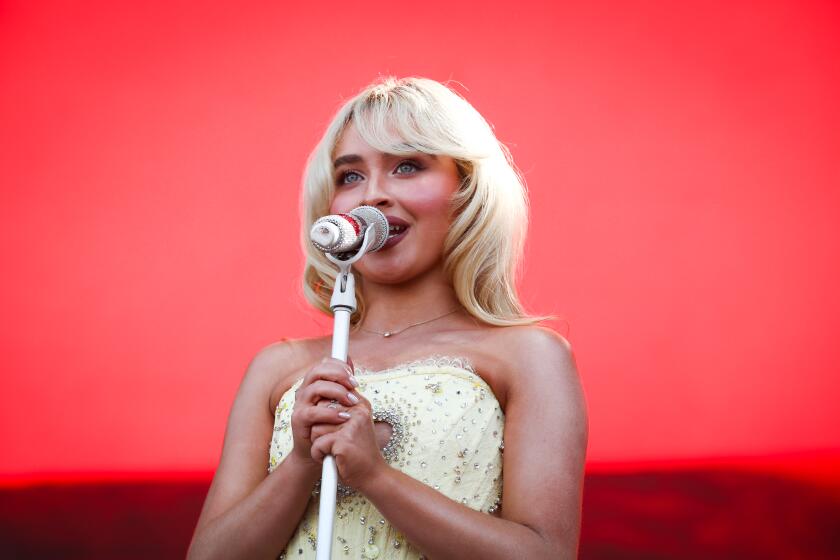Ex-Monkees Michael Nesmith will show his country roots at Stagecoach
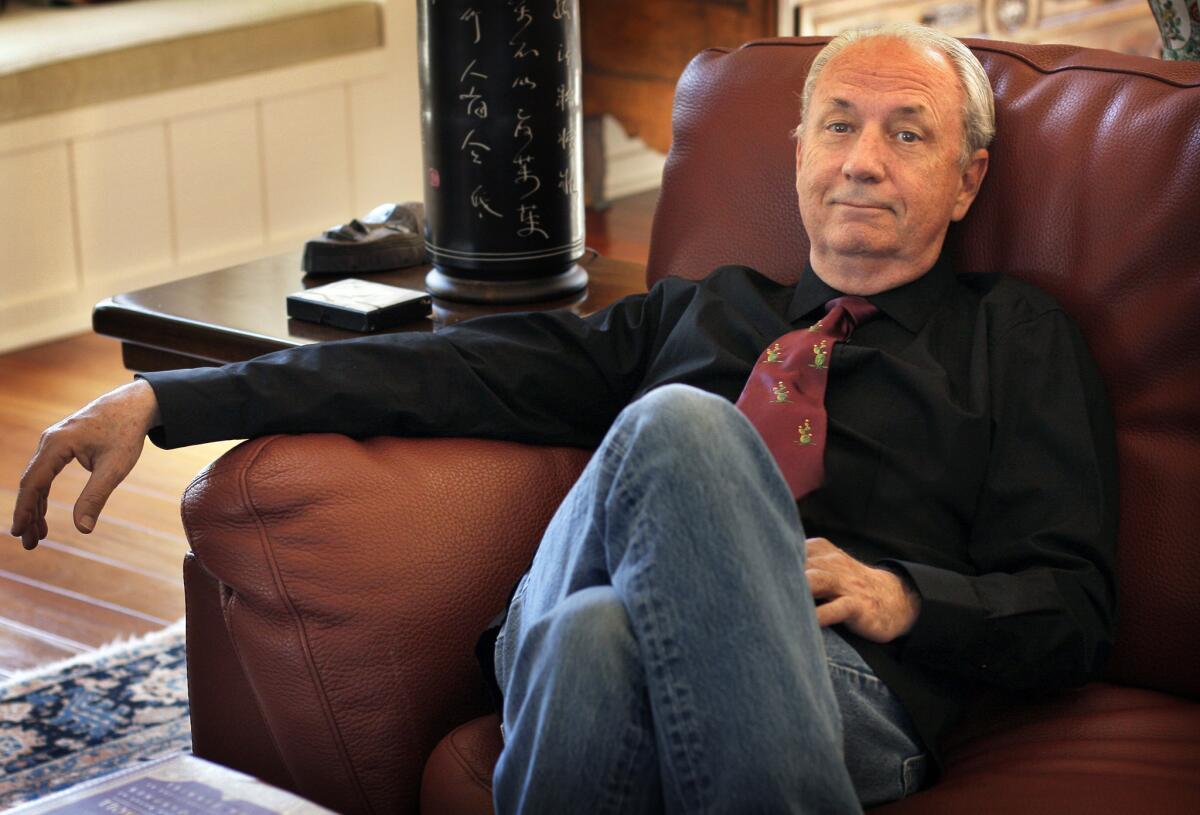
Michael Nesmith’s name is far more often associated with the Monkees than the birth of Southern California country rock. Yet the former rock sitcom star played a key part in a 1960s scene when long hair and cowboy boots all a sudden made sense together.
Nesmith blended rock and country music alongside artists such as Linda Ronstadt and Gram Parsons. Much of it happened at the Troubadour, where the hybrid sound was taking shape. “Linda would come play, the Dillards, [Roger] McGuinn would come play, [David] Crosby and Stephen [Stills] and Neil [Young] and all these guys,” said Nesmith.”I was the master of ceremonies of that thing.”
But Monkees’ producers, as well as record-company executives, weren’t ready to don cowboy hats for Nesmith. They “didn’t want to have a twang on the show, and they didn’t want a twang on the records,” Nesmith recalls.
TIMELINE: Stagecoach and Coachella music festivals
This weekend audiences will be reminded, or perhaps even introduced, to his genre-bending talents when he plays Sunday at the Stagecoach Country Music Festival in Indio.
His set will focus on “the country-rock material of the late ‘60s and early ‘70s,” says Nesmith, 71, over the phone from Nashville, where he and his band were gearing up for the festival. “It will be up-tempo, and a bit more twangy.”
It will also be a chance for Nesmith to play what’s closest to his heart.
When the young singer-songwriter was cast as “the smart Monkee” with the green wool cap and the show quickly turned into a hit in 1966, he rarely had time to head down to the Troubadour. Yet even in that band and through songs he wrote that others recorded, he became a pivotal figure in the birth of what came to be known as country-rock.
For those who were paying close attention, however, it was evident even at the outset of the Monkees’ career as a fictitious TV version of a rock band that Nesmith was bringing that twang to the group’s catchy pop sound.
His song “Papa Gene’s Blues” on “The Monkees” debut album in 1966 proved that you might take the musician out of Texas and plop him in the middle of Hollywood, but you couldn’t take Texas out of this musician.
In addition to country-tinged songs of his own, Nesmith also took the opportunity to record such Southwest-slanted material as future country — and western — singer-songwriter Michael Martin Murphey’s “What Am I Doing Hangin’ ‘Round” for their 1967 No. 1 album “Pisces, Aquarius, Capricorn & Jones Ltd.”
But when Nesmith parted ways with the group, things really got interesting.
In 1970 he released “Magnetic South,” the first in a string of albums with the group he dubbed the First National Band, consisting of bassist John London, drummer John Ware and the musician who would become his musical foil over the next two decades, steel guitarist O.J. “Red” Rhodes.
Nesmith seamlessly blended the heart-on-sleeve emotion of traditional country with the energy and liberating spirit of rock and the lyrical sophistication of folk and Tin Pan Alley, along the way charting minor pop hits including “Joanne,” “Silver Moon” and “Nevada Fighter.”
In the late-’70s, the balance shifted more toward rock — Rhodes still aboard in an otherwise new band lineup — when Nesmith began experimenting with music videos, notably a seven-minute song called “Rio” that became an international hit and was added to the permanent collection at the Museum of Modern Art in New York. It gave him the idea for a show built around music videos, which he called “PopClips” and had more success with overseas than in the U.S. It served as a loose a template for what would become MTV.
That also helped pave the way for “Elephant Parts,” an original compilation of music videos and comedy sketches in 1981 that earned Nesmith the first music video Grammy Award bestowed by the Recording Academy.
He parlayed “Elephant Parts” into a musical variety series that ran during the summer of 1985 and featured guests including Jerry Lee Lewis, Rosanne Cash and Jimmy Buffett as well as comedians such as Jay Leno, Jerry Seinfeld, Whoopi Goldberg, Arsenio Hall and Garry Shandling.
Nesmith became an entertainment entrepreneur, working with PBS in bringing many of the network’s programs to home video while continuing to release new music periodically. He was among the pioneers of self-released recordings when he started his Pacific Arts record label and initially sold recordings by mail order, including an innovative hybrid album-book titled “The Prison.”
PHOTOS: Unexpected musical collaborations
He’s reunited with ex-bandmates Micky Dolenz and Peter Tork, following the death in 2011 of Monkees singer Davy Jones, for a couple of well-received Monkees reunion tours, and they’ll be together again for another round of shows starting in May.
He’s also embarking on a solo tour, continuing what he’s dubbed his “Movies of the Mind” shows — introspective songs for sit-down audiences in clubs and theaters. That stint includes a stop Tuesday at the Roxy in West Hollywood and Wednesday at the Belly Up in Solana Beach.
For Stagecoach, though, “It will be different than the ‘Movies of the Mind,’” he said. “I don’t expect anyone to sit and listen. We will get ‘Rio’ and ‘Cruisin’ ’ and the ‘Elephant Parts’ stuff in there as well.”
Looking back on his career, Nesmith said, “It’s been interesting.... I’ve been watching the arc of the music — where it goes from there, to when I end with the country-rock version of [the 1969 Monkees hit single] ‘Listen to the Band,’” he said. “It’s amazing to me how that line has persisted through the music, how it hasn’t steered too much away from that while it’s gotten more inclusive, more broad.
“Instead of becoming more and more country, more narrow and tight into country side of things, it’s opened up. From there it goes right straight through the music videos through the ‘Television Parts’ stuff all the way to today,” he said. “I’m having the best time doing it.”
Twitter: @RandyLewis2
More to Read
The biggest entertainment stories
Get our big stories about Hollywood, film, television, music, arts, culture and more right in your inbox as soon as they publish.
You may occasionally receive promotional content from the Los Angeles Times.
